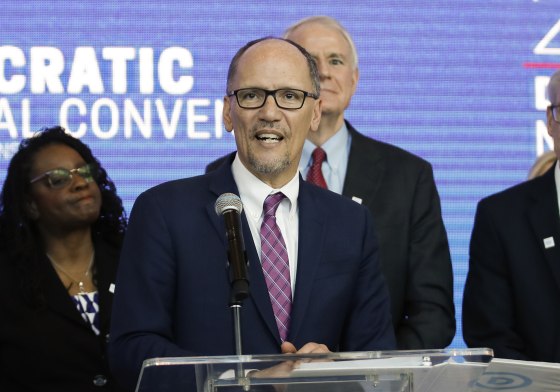WASHINGTON — With more than 20 candidates seeking to get on the first Democratic presidential debate stage and the field still growing, the Democratic National Committee is detailing its plans to winnow the number of participants if need be.
There are only 20 spots available in the first debate, hosted by NBC News and MSNBC in Miami over two nights on June 26 and 27. And with 21 declared candidates and at least two more expected to enter the race soon, there may not be enough room for all of them.
Candidates have until June 13, two weeks before the debate, to initially qualify by either collecting online donations from at least 65,000 people, or by registering at least 1 percent in three major polls.
At that point, campaigns will submit both their strongest polls and their donor information, which has to be verified by ActBlue, the Democrats’ online fundraising clearinghouse that works for all candidates.
Author and self-help guru Marianne Williamson just announced she hit the donations threshold, apparently becoming the 18th candidate to qualify, according to an unofficial NBC News tally.
The DNC, headed by Tom Perez, had earlier laid out the basics of how a tiebreaker would work, but offered more details Thursday on the precise methodology, which was agreed to by NBC News and CNN, as the media sponsors of the first and second debates.
If more than 20 candidates initially qualify, then preference will be given to candidates who meet both the polling and donations thresholds.
If more than 20 candidates meet both thresholds, then the candidates with the highest polling average will be given preference.
However, it’s more likely that fewer than 20 candidates will hit both. So far, just 11 candidates have done so, according to the unofficial NBC News tally.
In that case, the remaining spots would be filled by the candidates with the highest polling averages.
The rub, however, is that a bunch of candidates are likely to be tied around 1 percent in polls. If that's the case, then the candidates will be ranked according to the total number of qualifying polls they submit that show them at 1 percent or above. Those at the top of the list will be added until all 20 spots are filled.
Qualifying polls include those sponsored by news media organizations as well ones conducted by well-regarded universities, such as Monmouth and Quinnipiac.
Once the participants are selected, it will need to be determined which candidates appear on which nights. That will be decided by some kind of randomization method, to be determined by the DNC and their media partners.
Then, about two weeks out from the debate, the DNC and the media partners will announce who made it and which night they'll debate.
The politics of the debate selection process is as delicate as the system is complex, since campaigns view debates as make-or-break moments and have been known to protest and even sue in the past if they feel the process is unfair.
That was the case in 2016, when Martin O'Malley's campaign staged a protest outside the DNC while allies of Sen. Bernie Sanders, I-Vt., complained that the DNC was favoring Hillary Clinton with the debate process.
The Republican National Committee, meanwhile, faced complaints of its own for separating higher- and lower-polling candidates into separate debates.

